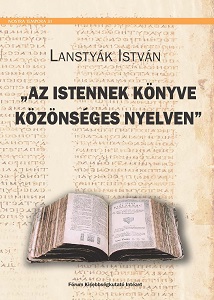"Az Istennek könyve közönséges nyelven". Tanulmányok a bibliafordításról
The Book of God in Ordinary Language. Bible Translation Studies
Author(s): István Lanstyák
Subject(s): Language studies, Language and Literature Studies, Translation Studies
Published by: Fórum Kisebbségkutató Intézet
Keywords: translation; Hungarian language; New Testament; revisions;relevance theory;
Summary/Abstract: This monograph is one of the results of more than twenty years of research, especially in the field of translation studies (traductology), but also partly in the field of language problem management and problem management in general, which gives this work an interdisciplinary character. The individual chapters of the monograph are based primarily on research that has taken place in the last eight years (since 2013), in which the author addressed both theoretical issues of translation of the New Testament and empirical research, the source of which was older and newer translations of the New Testament into Hungarian language and their revisions. In one of the chapters, the author also used the results of his research in the field of language problem management and problem management in general. The main theoretical goal of the author's research was and is to contribute to the application of the relevance theory developed by Dan Sperber and Deirdre Wilson in the 1980s to the translation of the Bible into Hungarian, but also to revisions of existing translations. An important aspect of this research is considering the problems of translation (more precisely the problems of the translation process, but also those of the perception of translation) as a management of language problems, based on the language management theory developed in the 1970s and 1980s by Jiří Neustupný and Björn Jernudd. The most important practical goal of the research was and is to provide technical assistance to translators and other professionals involved in the revision of older translations (especially, but not exclusively) of the Bible through the analysis of the management process or various translation solutions, and also to help ensure that newer translations, as well as revisions of older ones, are detached from traditional approaches based on either the so-called formal, or the so-called dynamic (functional) equivalence and approach the translations or revisions from the perspective of the relevance theory, using also relevant knowledge from the field of language problem management and various theories of problem management. The monograph consists of four thematic blocks. In the first, the author synthesizes his research in the field of language problem management and applies it to translation in general, with special regard to translation of the Bible. The second block is devoted to various translation issues of a theoretical nature. In the third block, the author deals with the most important and most recognized translation of the Bible into Hungarian, the translation of Gáspár Károli from 1590 and its subsequent revisions until the most recent one, which was published in 2011. The last thematic block deals with the issue of different types of translations of the Bible into Hungarian intended for different groups of readers, as well as with strategies for achieving diversity in the process of revising existing translations. The monograph also contains a preface, a bibliography and other references. The target audience of the monograph is both translation experts––traductologists and translators (not only of the Bible), as well as other experts who participate in the revision of existing translations. In addition, the monograph can also serve as additional teaching material for students of bachelor's, master's and doctoral translation studies. As the monograph combines a theoretical approach and practical issues in language problem management that occur in the translation process and the perception of translation, it can contribute to the improvement of new translations and revisions of the Bible into the Hungarian language.
Series: NOSTRA TEMPORA
- Print-ISBN-13: 978-80-89978-19-9
- Page Count: 192
- Publication Year: 2021
- Language: Hungarian
- eBook-PDF
- Table of Content
- Sample-PDF
- Introduction

